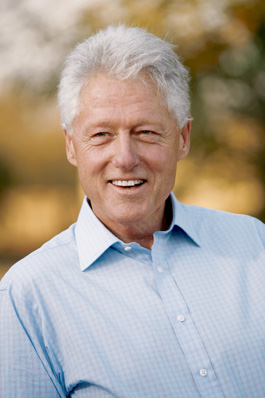home | metro silicon valley index | the arts | books | review

Ex Marks the Spot: Bill Clinton is proving to be more effective out of office than in.
Sweet Charity
The Clinton who isn't running offers hope for individual giving in a poverty-stricken world.
By John Freeman
Like Jimmy Carter before him, Bill Clinton has arguably been more effective outside the Oval Office than he was inside it. Since 2000, he has traveled the world raising money for HIV/AIDS treatment in Africa, using his fame to prod world leaders into thinking about climate change, childhood obesity and poverty. In three years, his Clinton Global Initiative--a conference that draws the best minds from around the world--has raised more than $10 billion to address such problems.
But one needn't be former leader of the free world to effect change, Clinton says. His latest book, Giving, is a powerful, inspirational guide for how everyday citizens can become part of what he sees as a growing network of generosity.
"The modern world, for all its blessings, is unequal, unstable and unsustainable," Clinton writes, referring to the fact that over half the globe's population live on less than $2 a day. In short: We can do better.
Clinton believes this is so because he has seen how quickly generosity can make a difference. Giving is a chronicle of these efforts, and it's hard not to be moved by the stories Clinton recounts.
There's Diane Stevens, a Maryland hairdresser who raised money to send an army of stylists over to war-torn Sierra Leone to teach women how to become beauty specialists. In Arkansas, we meet Heifer International, which since 1944 has given away 10 million income-producing animals. In New York City, there's Chess in the Schools, which since 1986 has taught the thinking man's game to more than 27,000 students.
The variety of programs Clinton profiles is astonishing. He has discovered or been roped into nonprofits that give away everything from bicycles to books, hairpieces to surplus medical supplies, golf clubs to dress shirts (for young men who would like to attend a job interview)--and even guitars. People are setting up basketball leagues in the Middle East, building schools in Pakistan and restoring homes in New Orleans.
What is genuinely inspiring about the programs Clinton talks about is that--contrary to, say, federal and local government examples after Katrina--they work. Heifer's program requires recipients to donate one of their livestock's offspring to someone else, thereby increasing the company's reach exponentially. Kids who come through Chess in the Schools have demonstrably higher test scores on all levels. The microloans made by recent Nobel Prize winner Muhammad Yunus' Grameen Bank to the needy are repaid 98 percent of the time and almost 60 percent of its recipients lift themselves out of poverty.
Here is the often overlooked positive side to the age of information: the globalization of compassion. Many of the initiatives Clinton highlights involve Americans helping non-Americans, or the other way around.
Several of them have websites, such as Kiva.org, which allows individuals to become microlenders themselves, picking among applicants and sending money by credit card to a local partner which makes the loan to a business. In such fashion, a butcher in Manhasset can loan money to a baker from Marrakesh.
This is an exciting development, so thrilling that one almost overlooks how deftly Clinton sidesteps the issue of government's failure to address these needs. If there is anything that emerges from Giving, it is Clinton's remarkable and unflappable faith in the power of markets and people to transcend these governmental shortfalls and to move on.
Surely, there are some who will claim this dodge is a political move, with Hillary on the campaign trail and who knows what in Bill's future. But what's remarkable about Giving is that it marshals so much evidence to the contrary that one wants to stop harping on these failures and do something positive for a change.
GIVING: HOW EACH OF US CAN CHANGE THE WORLD, by Bill Clinton; Knopf; 240 pages; $24.95 cloth. John Freeman is president of the National Book Critics Circle.
Send a letter to the editor about this story.
|
|
|
|
|
|